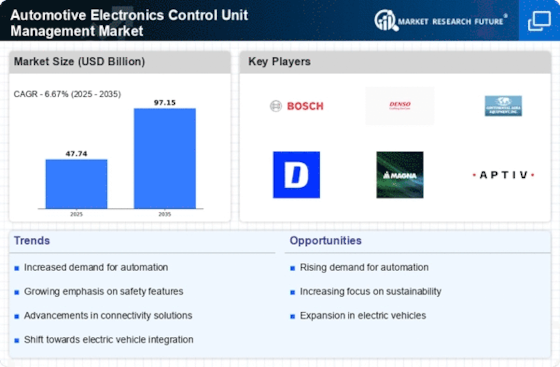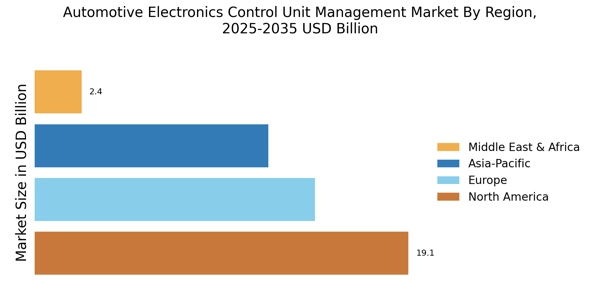Emphasis on Vehicle Connectivity
The emphasis on vehicle connectivity is transforming the Automotive Electronics Control Unit Management Market. With the rise of the Internet of Things (IoT) and connected car technologies, vehicles are becoming increasingly integrated with digital ecosystems. This connectivity enables features such as remote diagnostics, over-the-air updates, and enhanced infotainment systems, all of which rely on sophisticated electronic control units. Market analysis suggests that the connected car market is poised for exponential growth, with projections indicating a potential market size exceeding several billion dollars by the end of the decade. As a result, the Automotive Electronics Control Unit Management Market must adapt to meet the demands of this interconnected landscape.
Growth of Electric and Hybrid Vehicles
The burgeoning growth of electric and hybrid vehicles serves as a crucial driver for the Automotive Electronics Control Unit Management Market. As consumers increasingly prioritize sustainability and fuel efficiency, automakers are investing heavily in electric powertrains and hybrid technologies. This shift necessitates the development of advanced electronic control units that manage battery systems, energy distribution, and regenerative braking. Market data indicates that the electric vehicle segment is expected to account for a substantial share of total vehicle sales by 2030, further propelling the demand for specialized control units. Consequently, the Automotive Electronics Control Unit Management Market is likely to experience robust growth as manufacturers adapt to these evolving vehicle architectures.
Regulatory Compliance and Safety Standards
Regulatory compliance and safety standards are significant drivers influencing the Automotive Electronics Control Unit Management Market. Governments worldwide are implementing stringent regulations aimed at enhancing vehicle safety and reducing emissions. These regulations necessitate the incorporation of advanced electronic control units that can monitor and manage various vehicle functions to ensure compliance. For instance, the introduction of new safety standards may require the integration of additional sensors and control algorithms, thereby increasing the complexity and demand for electronic control units. As the automotive industry navigates these evolving regulatory landscapes, the Automotive Electronics Control Unit Management Market is likely to see increased investment in innovative electronic solutions to meet compliance requirements.
Rising Consumer Demand for Enhanced Features
Rising consumer demand for enhanced features in vehicles is a driving force behind the Automotive Electronics Control Unit Management Market. Modern consumers are increasingly seeking vehicles equipped with advanced functionalities such as infotainment systems, enhanced safety features, and personalized driving experiences. This trend compels manufacturers to invest in sophisticated electronic control units that can support these features. Market Research Future indicates that consumer preferences are shifting towards vehicles that offer seamless integration of technology and user-friendly interfaces. Consequently, the Automotive Electronics Control Unit Management Market is expected to expand as manufacturers strive to meet these evolving consumer expectations and enhance the overall driving experience.
Integration of Advanced Driver-Assistance Systems (ADAS)
The integration of Advanced Driver-Assistance Systems (ADAS) is a pivotal driver for the Automotive Electronics Control Unit Management Market. As vehicles increasingly incorporate features such as adaptive cruise control, lane-keeping assistance, and automated parking, the demand for sophisticated control units rises. These systems require complex algorithms and real-time data processing capabilities, which are facilitated by advanced electronic control units. The market for ADAS is projected to grow significantly, with estimates suggesting a compound annual growth rate of over 20% in the coming years. This growth directly influences the Automotive Electronics Control Unit Management Market, as manufacturers strive to enhance safety and efficiency through innovative electronic solutions.

















